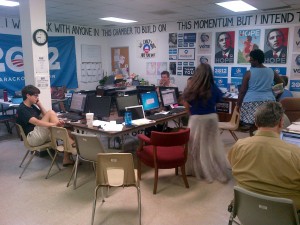
A rare moment of calm in the downtown office. Photo by George Hammond.
The downtown office of ‘Organizing For America’, Obama’s grassroots campaign, is a hive of activity. Its heavily decorated doors, adorned with pictures of the President beaming or looking statesmanlike and surrounded by familiar slogans such as “Yes We Can!”, see heavy traffic throughout the day and often late into the night
As the hub of operations for North Carolina’s capital city, Raleigh, the office plays host not only to the staffers (distinguishable by their purposeful strides, manic expressions and typically profuse sweating) but also to volunteers and occasional passers-by offering support, abuse or more typically seeking a bumper sticker.
The staffers are without exception below forty. The prerequisites of abundant energy and a willingness to sacrifice all traces of a personal life tend to preclude anyone older. The volunteers represent a broader spectrum. The youngest, an idealistic seventeen year old from the drastically more liberal state of California, has left family and friends to pursue a Democrat victory for a state further from her home than Timbuktu is from London. Amongst the eldest is Bill, or, given that he is a African American senior in North Carolina, Mr. Bill. His characteristic languid gait and panama hat are out of place in an office more used to controlled half-jogs and baseball caps, but the older demographic play a huge role as well.
It is well-documented that Obama’s is a campaign that places emphasis far more on grassroots than any that has preceded it. So it is that the tactics for engaging the electorate in Raleigh are often dictated more by demographic than by resource. Much has been made of the sophistication of the Obama campaign’s data on potential voters and this is no more keenly felt than on the ground, where the rules of engagement for one group are vastly different to those of another. Mr Bill, for instance, is respected by the same local churches who have always played a part in community organisation, and is thus a valuable asset in the campaign. Conversely, Ken and Byron, two Field Organizers working in underprivileged African American communities eschew all conventional power structures and instead look to Mr Jones. A patriarch of sorts, I quickly learn that Mr Jones can pull in any number of favours from his community, from conjuring marquees to rallying drug dealers to register voters. Mr Jones understands as well as anyone that a one size fits all strategy cannot work in a grassroots campaign, telling me on our first meeting that it might be best to steer clear of an upcoming block party organised by the campaign as “they don’t take to kind to outsiders down there.”
The ‘team’ in the office can appear startlingly diverse. There are the sorority girls sent to local uni campuses to flirt votes out of freshmen, or the college graduates who, desperate for job security, stand sweating on street corners eking out a few voter registrations. Then there are the seniors who enter data into the small hours because for some unbeknownst reason they insist upon using only one digit per hand, or the group of thirty Canadians who flew in for a week of intensive volunteering. And yet there is one crucial commonality between all of these people: they all care deeply about the future of their country and of their state.
Americans are far more prone to casual eulogy than their European cousins, and listening to snippets of conversations during the evening calling sessions was an education in the issues facing average Americans. The ideological battleground on which the election is being fought was broken down daily into personal narratives in the Raleigh office. Jhostyn’s tale of prohibitive college fees, Karl’s story of a mother saved by Medicare and Anne-Marie’s praise for a boyfriend serving abroad were repeated again and again to dubious voters. Collectively the Field Organisers wove a tapestry that could be understood by the majority of North Carolinians and that brought the campaign into peoples living rooms – not through flickering images of airbrushed families with diatribes voiced over, but with a personal dialogue. No matter how contrived these conversations become they, along with the daily selection of canvasses, voter registration drives, house parties and university talks, are the essence of community organising.
Critics rightly point to the optimism gap in this election cycle compared to 2008, and well they might with a troubled economy, high jobless rate and little tangible conversion of rhetoric into policy from Obama. And yet the energy, positivity and self-sacrifice on display in Raleigh is striking. It is indicative of the fact that this election matters every bit as much as the last and that the choices are if anything more stark. One Field Organiser, Byron, suggested to me that the campaign motto might as well be “The Audacity of Nope” as limited finance meant that staff couldn’t expect much help from above. In a lamenting tone he ad libbed a would be negotiation. “Can we have $100 dollars for a registration drive? Nope. A few new phones for call time? Nope. Well how about a cute little bumper sticker? You get the picture…”But Byron expressed no resentment, not even as he spent the next hour parting with his own dollars to fund an ‘African Americans For Obama’ event. He was willing to work for fourteen hours a day, estrange himself from friends and family, face daily bigotry and ignorance and go home with less than else he might. Byron and his colleagues did so because they care to the cores who wins this election. Lets hope come November 6th they can hold their heads high and once again say “Yes We Did!”
For more Oxonian Globalist coverage and comment on the US Election:



